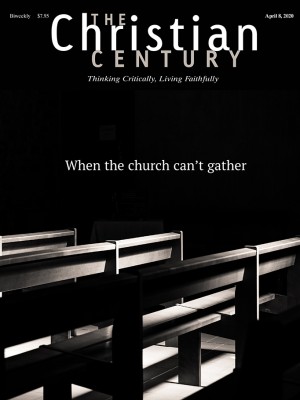April 10, Good Friday (Psalm 22; John 18:1–19:42)
Things Pilate cannot touch: creative life, confounding power
“What is truth?” Pilate asks. He is trying to reconcile this person he sees before him with the turmoil swirling in his city. He is trying to place Jesus in terms he can understand. Kingship. Power. Authority.
Who is this man who seems to have power, seems to have authority, and yet here he is—bound, bleeding, seemingly despised? Jesus seems to embody the paradox of the psalmist’s “why” and “yet.” (“Why have you forsaken me . . . Yet you are holy.”) Jesus is the one in chains, the one who has been betrayed, the one whose friends have left him, the one who needs Pilate to save him.
And yet Jesus is the one who speaks of bearing witness and truth. Jesus seems to possess all the certainty, while Pilate is the one who seems confused. Pilate plucks out a word, kingship, as a way of tethering himself as he looks from Jesus to the crowd to the Sanhedrin. But the question is resolved only in terms of who has power and who can keep it—more specifically, how Pilate can keep his.
Read our latest issue or browse back issues.
Jesus’ invocation of truth and witness is about a different kind of power, though. Truth is something that is not held or wielded or manipulated so much as unveiled, revealed as having been there all along. Truth reverberates, even within the psalmist’s questions, even while the questions seem irreconcilable. We are suffering, yet you are strong, God, they cry out again and again. The psalm seems to swing between these claims until the end, where “future generations will be told about the Lord, and proclaim his deliverance to a people yet unborn, saying that he has done it.”
How can both of these things be true? The power of the empire and the power of God? It is a question my students and my wife’s congregants ask repeatedly in the midst of a world where, despite our advances in science, medicine, and computers, somehow fear and greed and ignorance march forward relentlessly. The “why” of the psalmist feels like the most real thing. The “yet” feels like a fantasy.
Toni Morrison reflects on a related question: How can a people hold a certainty of themselves in the midst of utter and violent refusal? Morrison writes, “Black people could be enslaved for generation after generation and recorded in statistics along with lists of rice, tar, and turpentine cargo, but they did not turn out to be cargo. . . . Why was the quality of my great-grandmother’s life so much better than the circumstances of her life?” How do people begin to create space, to bear witness to a truth about themselves and their community that gets refused in seemingly countless ways on a daily basis? How does one speak and live into a truth while facing down the powers and principalities?
Quoting Bessie Head, Morrison writes that “we tolerate strangers because the things we love cannot be touched by them.” Throughout history there have been women and men creating life and confounding power.
Between Morrison and the psalmist, I wonder if we begin to feel something of the truth Jesus speaks of and the confusion Pilate feels.
There is something in this world—beyond the violence and the manipulation and the denial and the misapprehension—something that sits lodged in our midst, pressing on our chests and not letting some of us forget who we are. There is something Pilate cannot touch, and kingship is the only word he can use to grasp it. But its power is too deep, too alive, too free to be contained in such a fragile status as “king.”
Jesus knows his people, and his people know him. The recognition of truths that bind us to one another is ephemeral and indeterminate and yet unrelentingly present. The truth cannot be scourged with whips or mocked with crowns of thorns and faux garments. The truth rings in a way that shivers the very ground and causes curtains to tear from heaven to earth.
The truth of Good Friday is that while Pilate scurries between Jesus and the people and his little bowl of water and back, trying desperately to hold onto little folds of papered authority, Jesus had already sunk his hands deep into the ground and grasped the roots of our lives. We are his. He is ours. God has become like us, so that we might become like God. We see him and he sees us. There are things we love that Pilate cannot touch.
In such dire times, perhaps it is not the academics or the politicians or the pastors who will help us to see our way through. Maybe it is the aunties, the grandmothers and grandfathers who knew, who lived the truth they themselves had received from their own mothers and aunts and grandmothers. We cannot learn this truth. We cannot accumulate it. We can only live it, and let it live in us. It is a truth we can only let seep into us in mornings and dinners and nods on the street, through the music in the car, sometimes even at Sunday gatherings. Good Friday is here, yet Sunday is coming.







